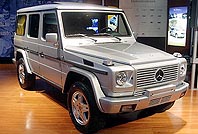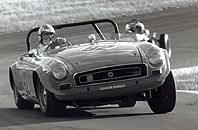 Last week I mentioned the success of the PT Cruiser from Chrysler. Whilst I must
admit I do not like its “retro” styling, it appears the world at large does. Even my acid tongued mate in Australia, John Weinthal, said that the PT Cruiser was a great
car, and John and I see eye to eye in most things motoring, so perhaps it is a modern “classic”.
Last week I mentioned the success of the PT Cruiser from Chrysler. Whilst I must
admit I do not like its “retro” styling, it appears the world at large does. Even my acid tongued mate in Australia, John Weinthal, said that the PT Cruiser was a great
car, and John and I see eye to eye in most things motoring, so perhaps it is a modern “classic”.
Now DaimlerChrysler has said it will increase production of the PT Cruiser by 80,000 units beginning in late 2002. The increase will bring total annual
production to 310,000 units.
The company will invest USD 300 million to expand its Toluca, Mexico, assembly plant to handle the increase. As reported last week, currently, 180,000 PT
Cruisers are produced at the Toluca plant and another 50,000 are made at the company’s Eurostar facility in Graz, Austria.
Since the PT Cruiser debuted in March 2000, more than 175,000 units have been sold worldwide. To satisfy regional demand, all 180,000 cars produced at
Toluca will be allocated to the North American market, so any that come here will be from the European assembly plant.
The General nicks the PT Cruiser’s designer
General Motors has lured Bryan Nesbitt, the 32-year-old designer of the Chrysler PT Cruiser, away from its rival to join Chevrolet. At GM, Nesbitt will be
the lead designer for Chevrolet’s concept vehicles and help set the future design direction for the division.
Nesbitt’s hiring is the latest in a string of designers acquired by GM. Those hirings include Anne Asensio, 39, lured away from Renault in October last
year to be executive director of GM’s brand character centre. GM are pinning their hopes on fresh young talent, with the average age of the thirteen designers who hold
positions similar to Nesbitt’s being 35 years old.
Jumping ship at the right time?
Nesbitt may have made the right career move, because despite the popularity of his PT Cruiser, Chrysler lost USD 1.2 billion in the first quarter of this
year. No small bikkies!
DaimlerChrysler blamed a slower U.S. market, incentive spending and the cost of restructuring for the bleak performance posted by the Chrysler group.
Revenues dropped 28% to $12 billion, and total sales also decreased 28% to 660,900 vehicles from last year’s 923,600.
Chrysler CEO, Dieter Zetsche said that the worst is over for the U.S. unit and that “three considerably better quarters are to come.” I’m sure he is
losing some sleep over it, though. Much of the future plans unfortunately have a high price in human resources. Zetsche said Chrysler plans to reduce its work force by 26,000
jobs.
 The other side of the DaimlerChrysler conglomerate is doing nicely, however.
Mercedes-Benz continues to set record sales and profits. The worldwide unit returned revenues of USD 9.8 billion in the quarter, a 13 percent increase compared with last
year, returning an operating profit for the quarter of USD 600 million. Mind you, if I had 9.8 billion in the bank, I think I’d expect a little more than 600 million in
interest. Makes you think, doesn’t it!
The other side of the DaimlerChrysler conglomerate is doing nicely, however.
Mercedes-Benz continues to set record sales and profits. The worldwide unit returned revenues of USD 9.8 billion in the quarter, a 13 percent increase compared with last
year, returning an operating profit for the quarter of USD 600 million. Mind you, if I had 9.8 billion in the bank, I think I’d expect a little more than 600 million in
interest. Makes you think, doesn’t it!
Racing Rubber
Much is made of the choice of rubber for the F1 cars these days. “Hard” and “Soft” compounds being bandied around as the teams make up their minds
as to which to use for the race. Soft sticks better to the road, while the hard is more durable. Generally, using the soft compounds will mean two pit stops, while the harder
compounds will go through to make it just one pit stop.
Now here’s the interesting bit - the tyre compound the team qualifies on is the compound they have to run for the race. This was done to stop the use of
“gumballs” - a special qualifying compound that was good for three laps and then throw the tyres away.
 Tyre technology is incredible and the difference it can make to lap times is
amazing. I first found this out in the dim dark distant ages when I raced my MGA. At that stage, an impecunious medical student with the car on HP and driving under an
assumed name, I raced on the road rubber that took me to University each morning. That was until my mate Blair gave me four worn out racing tyres.
Tyre technology is incredible and the difference it can make to lap times is
amazing. I first found this out in the dim dark distant ages when I raced my MGA. At that stage, an impecunious medical student with the car on HP and driving under an
assumed name, I raced on the road rubber that took me to University each morning. That was until my mate Blair gave me four worn out racing tyres.
These tyres had a chequered history. The top open wheel racer of the day had a Dunlop contract, so he didn’t pay for his tyres, so after a couple of
meetings he passed them on to a friend of his who raced a Lotus XV. After another couple of races the tyres were passed down to Blair who then ran them till they were almost
bald. It was at this bottom end of the food chain that I came in.
By carefully measuring the (lack of) tread I worked out that some tyres would probably do five laps, or even eight if I were lucky and I became a driver on
“race” rubber. Thirty-five years ago this was something! I also believe that I invented “slick” tyres, as there was never any tread left at the end of the races. In
fact, I used to have to get the car scrutineered on another set of wheels and tyres as the officials would not have let me start if they saw what the tyres looked like.
I can still remember the first really “sticky” tyres I ever bought. Firestone YB 11’s. Anyone remember them? I was racing the Works Team MGB in 1970
and we needed just a little “something” to snare the lap record. “Get some YB 11’s,” I was told. I enquired and went pale at the price. $68.33 each. In 1970 that
was really expensive, but I went for it and MGB sat on these expensive boots.
At the race meeting that weekend we blitzed the opposition, set the new lap record and sang the praises of YB 11. That was until I looked at them and saw
that they had lasted three races. Not three meetings, but three races with a total of 21 laps. They say everything in life has its price - that lap record cost me $273.32.
FIA signs a 100 year USD 309 million agreement for Formula One Commercial Rights
This deal has been reported all over the world, but I’m afraid the world of big business baffles me. In fact, I’m probably not all that good with small
business either, but this latest move from the FIA, the governing body of motor sport, I find quite astounding. Talk about thinking ahead! Like 100 years. None of the
signatories to this will be alive in 100 years.
However, the report says that the FIA has confirmed that it has concluded a 100 year, $309m agreement for the commercial rights of the FIA Formula One
World championship.
The agreement with the Slavia Ecclestone Corporation (SLEC) group was reached in Paris between the FIA world motor sport council, SLEC representatives and
the Formula One Association represented by Bernie Ecclestone himself.
 “This agreement will not affect in any way the current Concorde Agreement which
expires on December 31, 2007,” the FIA said in a statement. I am so pleased!
“This agreement will not affect in any way the current Concorde Agreement which
expires on December 31, 2007,” the FIA said in a statement. I am so pleased!
However, what probably is important was the further statement saying, “This is a further important step by the FIA towards complying with the European
Commission’s requirement to separate commercial and promotional activities from the sport. SLEC and the Kirch Group have confirmed that the championship will continue to be
shown on free-to-air television.” At least we can continue to pop down to Shenanigans and watch it.
Autotrivia Quiz
Last week I asked how many cylinders in the engine of the 21 litre Metallurgique of 1919? This was easy - four! Can you imagine an engine with five and a
quarter litres per hole? The thing peak revved at 1200 RPM and was geared to do 98 MPH per thousand RPM in top gear! That’s what you call a real car.
So to this week. Remember the Alfa Romeo 75? They raced these in Europe with some success in the ’80s and following this Alfa sold a two door sports
coupe for the general public. This car was a racing 75 in a GRP body, with the V6 engine tweaked further. Top speed was 245 KPH. What was this car and who built it. Clue -
they built just over 1000 of them.
For the Automania FREE beer this week, be the first correct answer to fax 427 596 or email [email protected]